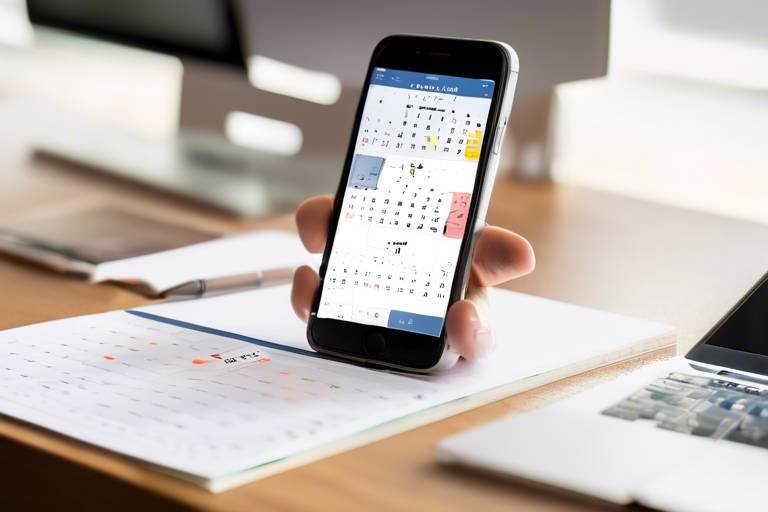How to Create a Balanced Work Schedule for Better Time Management
Effective time management is crucial for productivity. It allows individuals to make the most out of their day, accomplishing tasks efficiently while maintaining a healthy work-life balance. Creating a balanced work schedule is key to optimizing your time, increasing efficiency, and reducing stress, ultimately leading to improved overall well-being.
Assessing your priorities is the first step towards establishing a balanced work schedule. By identifying your most important tasks and goals, you can allocate your time effectively, ensuring that essential responsibilities are addressed first. This approach sets the foundation for a productive work schedule that aligns with your objectives.
Establishing a routine plays a significant role in enhancing time management. Developing a consistent daily schedule that includes designated time blocks for work, breaks, and personal activities can help improve focus and productivity throughout the day. By sticking to a routine, you create a sense of structure that allows you to navigate through tasks efficiently.
Utilizing time management tools can further streamline your workflow. Calendars, task lists, and productivity apps are valuable resources that can help you organize tasks, set deadlines, and track progress. These tools provide a visual representation of your schedule, making it easier to manage your time effectively and stay on track with your goals.
Setting realistic goals is essential for maintaining motivation and focus. By defining achievable objectives with specific timelines, you can track your progress and celebrate accomplishments along the way. This practice not only boosts productivity but also instills a sense of fulfillment, driving you to strive for continuous improvement.
Delegating tasks when necessary is another strategy to optimize your work schedule. Recognizing when certain responsibilities can be assigned to others frees up time for higher-priority tasks. Delegation promotes efficiency and effective time allocation, allowing you to focus on tasks that require your expertise and attention.
Prioritizing self-care is a fundamental aspect of creating a balanced work schedule. Incorporating activities such as exercise, relaxation, and social time into your routine is essential for preventing burnout and enhancing mental well-being. Taking care of yourself not only improves productivity but also contributes to a healthier and more sustainable work-life balance.
Limiting multitasking is key to maintaining focus and quality in your work. Instead of juggling multiple tasks simultaneously, concentrate on one task at a time to improve efficiency and reduce errors. By focusing your attention on individual tasks, you can complete them more effectively and produce higher-quality outcomes.
Regularly reviewing and adjusting your work schedule is vital for continuous improvement. Periodically assessing the effectiveness of your time management strategies allows you to identify areas for enhancement and make necessary adjustments. By staying proactive and adaptable, you can optimize your schedule to better align with your goals and priorities.
Seeking work-life balance is the ultimate goal of creating a balanced work schedule. By setting boundaries, prioritizing tasks, and allocating time for relaxation and enjoyment, you can achieve a harmonious integration of work and personal life. Striving for balance leads to a more fulfilling lifestyle, where productivity and well-being coexist harmoniously.

Assess Your Priorities
Effective time management is crucial for productivity. Explore strategies to create a balanced work schedule that optimizes your time, increases efficiency, and reduces stress, leading to improved work-life balance and overall well-being.
Determine your most important tasks and goals to allocate time effectively, ensuring essential responsibilities are addressed first for a productive work schedule. Assessing your priorities allows you to focus on what truly matters, helping you avoid getting overwhelmed by less crucial tasks.
One effective way to assess your priorities is to create a list of tasks ranked by importance. By identifying high-priority tasks, you can allocate your time and energy efficiently, ensuring that critical objectives are accomplished first.
Moreover, consider using a time tracking tool to monitor how much time you spend on different tasks. This data can provide valuable insights into where your time is being used most effectively and where adjustments are needed to improve your productivity.
Incorporating regular reviews of your priorities can help you stay on track and adapt to changing circumstances. By continuously assessing your goals and tasks, you can refine your work schedule to align with your evolving priorities and objectives.
Develop a consistent daily routine that includes designated time blocks for work, breaks, and personal activities to enhance focus and productivity throughout the day.
Explore various tools such as calendars, task lists, and productivity apps to organize tasks, set deadlines, and track progress for efficient time management.
Define achievable goals with specific timelines to stay motivated, maintain focus, and track progress, fostering a sense of accomplishment and boosting productivity.
Recognize when tasks can be delegated to others to free up time for higher-priority responsibilities, promoting efficiency and effective time allocation.
Include self-care activities in your schedule, such as exercise, relaxation, and social time, to prevent burnout, improve mental well-being, and enhance overall productivity.
Avoid multitasking to maintain focus and quality in your work. Instead, concentrate on one task at a time to improve efficiency and reduce errors.
Periodically review your work schedule to assess its effectiveness, identify areas for improvement, and make necessary adjustments to optimize your time management strategies.
Strive to create a harmonious balance between work and personal life by setting boundaries, prioritizing tasks, and allocating time for relaxation and enjoyment, leading to a more fulfilling lifestyle.
Q: How often should I review and adjust my work schedule?
A: It is recommended to review and adjust your work schedule on a weekly or bi-weekly basis to ensure that it aligns with your current priorities and goals.
Q: Is multitasking an effective way to manage time?
A: No, multitasking can actually decrease productivity and quality of work. It is better to focus on one task at a time for better results.
Q: How can I prioritize self-care while managing a busy work schedule?
A: Allocate specific time slots in your schedule for self-care activities and treat them as non-negotiable appointments to ensure you prioritize your well-being.

Establish a Routine
Effective time management is crucial for productivity. Explore strategies to create a balanced work schedule that optimizes your time, increases efficiency, and reduces stress, leading to improved work-life balance and overall well-being.
Creating a routine is like setting the stage for a successful performance. Just as a well-rehearsed actor knows their lines and cues, having a structured daily routine can enhance your focus and productivity. By establishing designated time blocks for work, breaks, and personal activities, you create a rhythm that keeps you in tune with your tasks throughout the day.
Imagine your routine as a well-choreographed dance routine. Each step flows seamlessly into the next, creating a harmonious balance of movement and rest. By following a consistent routine, you can eliminate the guesswork of how to structure your day and instead focus on performing each task with precision and efficiency.
Think of your routine as the backbone of your day, providing stability and structure to support your productivity. Just as a building needs a solid foundation to stand tall, a well-established routine can serve as the groundwork for a successful and fulfilling day.
Utilizing tools like calendars and task lists can further enhance your routine by helping you stay organized and on track. By incorporating these tools into your daily schedule, you can ensure that each task is given the attention and time it deserves, leading to a more productive and balanced work-life dynamic.

Utilize Time Management Tools
When it comes to optimizing your time and boosting productivity, utilizing time management tools can make a significant difference. These tools are designed to help you organize your tasks, set priorities, and track your progress effectively. By incorporating the right tools into your workflow, you can streamline your work processes and ensure that you are making the most of your time.
One popular time management tool is the calendar app, which allows you to schedule your tasks, meetings, and deadlines in one central location. By having a visual representation of your time commitments, you can better plan your day and ensure that you are allocating enough time to each task.
Task lists are another essential tool for effective time management. By creating a list of tasks that need to be completed, you can prioritize your work and focus on what needs to be done first. Task lists also help you stay organized and ensure that nothing falls through the cracks.
Productivity apps are increasingly popular for managing tasks, projects, and deadlines. These apps often come with features such as reminders, progress tracking, and collaboration tools, making it easier for you to stay on top of your work and work efficiently.
By incorporating these time management tools into your daily routine, you can take control of your schedule, stay organized, and make the most of your time. Whether you prefer digital tools or traditional methods, finding the right tools that work for you is key to improving your time management skills and achieving your goals.

Set Realistic Goals
Setting realistic goals is a fundamental aspect of effective time management and productivity. When establishing your goals, it is essential to create clear and achievable objectives that align with your overall priorities and aspirations. By defining specific goals with realistic timelines, you can enhance your motivation, maintain focus, and measure your progress effectively.
Consider breaking down larger objectives into smaller, manageable tasks to prevent feeling overwhelmed and increase your sense of accomplishment as you achieve each milestone. This approach not only boosts your productivity but also provides a clear roadmap for tracking your advancement towards the ultimate goal.
Moreover, setting realistic goals allows you to establish a sense of direction and purpose in your work, guiding your daily actions and decisions towards meaningful outcomes. By aligning your goals with your values and long-term vision, you can stay motivated and committed to pursuing excellence in your endeavors.
It is crucial to regularly review and adjust your goals as needed to adapt to changing circumstances or priorities. Flexibility in goal setting enables you to remain agile and responsive to challenges, ensuring that your objectives remain relevant and achievable in the dynamic work environment.
Remember that setting realistic goals is not about limiting your potential but rather about setting yourself up for success by creating attainable targets that push you towards growth and development. By striking a balance between ambition and feasibility, you can harness your full potential and maximize your productivity while maintaining a sense of accomplishment and fulfillment in your work.

Delegate Tasks When Necessary
Delegating tasks when necessary is a crucial aspect of creating a balanced work schedule for better time management. It involves recognizing when certain responsibilities can be assigned to others to free up valuable time for focusing on high-priority tasks. By effectively delegating, individuals can promote efficiency, improve productivity, and ensure that essential goals are met in a timely manner.
When considering delegation, it is essential to assess the strengths and capabilities of team members or colleagues. By understanding their skill sets and areas of expertise, tasks can be allocated to individuals who are best suited to handle them efficiently. This not only streamlines the workflow but also empowers team members to contribute effectively to the overall success of the project or organization.
Delegating tasks also provides an opportunity for professional growth and skill development. By entrusting certain responsibilities to others, individuals can focus on honing their own expertise and tackling more complex challenges that align with their strengths. This not only enhances individual performance but also fosters a collaborative work environment where everyone can thrive and contribute meaningfully.
Effective delegation requires clear communication and defined expectations. When assigning tasks to others, it is important to provide detailed instructions, timelines, and desired outcomes to ensure that the delegated responsibilities are carried out successfully. Regular check-ins and feedback sessions can also help monitor progress, address any challenges, and make necessary adjustments to ensure the smooth execution of tasks.
Furthermore, delegating tasks when necessary allows individuals to avoid becoming overwhelmed or burnt out by trying to handle everything on their own. By distributing workload strategically and leveraging the strengths of team members, individuals can maintain a healthy work-life balance, prevent stress and exhaustion, and sustain long-term productivity and job satisfaction.

Prioritize Self-Care
When it comes to creating a balanced work schedule for better time management, prioritizing self-care is a crucial component that is often overlooked. Just like a well-oiled machine needs regular maintenance to function optimally, your mind and body also require care and attention to perform at their best. Prioritizing self-care involves incorporating activities that nurture your physical, emotional, and mental well-being into your daily routine.
Imagine your body as a vehicle that needs fuel, maintenance, and rest to operate efficiently. Neglecting self-care is like driving a car without ever stopping for gas or maintenance – eventually, it will break down. Similarly, neglecting your well-being can lead to burnout, decreased productivity, and overall dissatisfaction with your work and life.
Self-care activities can vary from person to person, but common practices include regular exercise, adequate sleep, healthy eating, mindfulness or meditation, spending time with loved ones, pursuing hobbies, and engaging in activities that bring joy and relaxation. By prioritizing self-care, you are investing in your long-term health and happiness, which in turn positively impacts your work performance and overall quality of life.
Integrating self-care into your work schedule may initially seem challenging, especially when deadlines loom and responsibilities pile up. However, by viewing self-care as a non-negotiable part of your routine, you can improve your focus, energy levels, and resilience to stress. Remember, taking care of yourself is not selfish – it is essential for maintaining a healthy work-life balance and sustainable productivity.

Limit Multitasking
When it comes to boosting productivity and maintaining focus, one key strategy is to . While it may seem like juggling multiple tasks simultaneously can increase efficiency, it often leads to decreased productivity and more errors in the long run. By focusing on one task at a time, you can improve the quality of your work and complete tasks more effectively.
Imagine trying to cook multiple dishes at the same time in a busy kitchen – the chances of burning a meal or forgetting an ingredient are much higher when your attention is divided. Similarly, in a work setting, attempting to multitask can result in incomplete projects, missed deadlines, and increased stress levels.
Research has shown that the human brain is not designed to handle multiple tasks simultaneously. When you switch between tasks, your brain needs time to refocus and readjust, leading to a phenomenon known as "task-switching cost." This cost can significantly impact your overall productivity and the quality of your work.
By limiting multitasking and focusing on one task at a time, you can improve your concentration, enhance your problem-solving skills, and complete tasks more efficiently. This approach allows you to give each task the attention it deserves, leading to better outcomes and a more organized work schedule.

Review and Adjust Regularly
Regularly reviewing and adjusting your work schedule is essential for maintaining optimal productivity and efficiency. By periodically assessing how you allocate your time, you can identify areas that need improvement and make necessary adjustments to enhance your time management strategies.
Consider creating a table to visually organize your tasks, deadlines, and priorities. This can help you visualize your workload and identify any bottlenecks or overlapping responsibilities that may be hindering your productivity.
Additionally, seek feedback from colleagues or mentors on your work schedule. External perspectives can provide valuable insights and suggestions for optimizing your time management practices.
Keep a journal or use a digital tool to track your daily activities and time spent on each task. This data can reveal patterns, inefficiencies, or areas where you may be spending too much or too little time, allowing you to make informed decisions when adjusting your schedule.
When making changes to your work schedule, be flexible and open to experimentation. Not all strategies will work for everyone, so it's important to adapt and refine your approach based on what works best for you personally.

Seek Work-Life Balance
Seeking work-life balance is essential for overall well-being and productivity. It involves creating a harmonious relationship between your professional responsibilities and personal life to prevent burnout and enhance your quality of life. By setting boundaries, prioritizing tasks, and allocating time for relaxation and enjoyment, you can achieve a more fulfilling lifestyle.
Imagine your work-life balance as a delicate dance between your career and personal life. Just like a well-choreographed performance, finding the right balance requires careful planning and execution. It's about knowing when to step forward into work mode and when to gracefully step back into personal time.
Creating boundaries is like building a fence around your time and energy. It helps you protect your personal life from the demands of work and vice versa. By clearly defining when you are "on the clock" and when you are "off," you can maintain a healthy separation between your professional and personal spheres.
When prioritizing tasks, think of your time as a valuable currency. Invest it wisely in activities that bring you joy, fulfillment, and growth. By focusing on tasks that align with your goals and values, you can ensure that your time is spent meaningfully and in line with your aspirations.
Allocating time for relaxation and enjoyment is like adding color to a black-and-white picture. It brings vibrancy and vitality to your life, rejuvenating your spirit and boosting your creativity. Whether it's spending time with loved ones, pursuing hobbies, or simply taking a moment to unwind, self-care activities are essential for maintaining balance.
Remember, work-life balance is not a one-time achievement but an ongoing journey. It requires regular reflection, adjustment, and fine-tuning to ensure that your priorities are in alignment and your time is well-spent. By seeking work-life balance, you are investing in your long-term happiness and success.
Frequently Asked Questions
- How can I assess my priorities effectively?
To assess your priorities, start by listing all your tasks and goals. Then, determine which ones are most important and urgent. Allocate time accordingly, ensuring essential responsibilities are addressed first for a productive work schedule.
- What are some effective time management tools to utilize?
There are various time management tools available, such as calendars, task lists, and productivity apps. These tools can help you organize tasks, set deadlines, and track progress, leading to efficient time management and improved productivity.
- Why is it important to prioritize self-care in a work schedule?
Self-care is crucial for preventing burnout, improving mental well-being, and enhancing overall productivity. Including activities like exercise, relaxation, and social time in your schedule can help you recharge and maintain a healthy work-life balance.
















